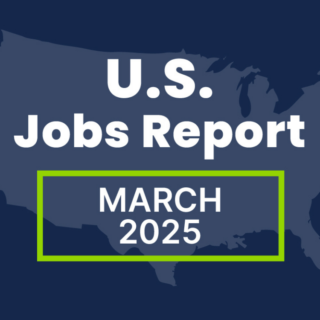The shifting technology landscape can seem overwhelming, but new developments happening every day are taking over the recruiting industry one step at a time. Smart companies need to stay on top of the trends and make changes at the right time. Here’s seven we’re watching.
1. Artificial intelligence
Artificial intelligence has been the topic of books and movies for decades, but AI is ubiquitous in our society and now transforming the recruiting industry. According to the Society for Human Resource Management, it isn’t a case of robots putting humans out of work. Instead, recruiters use technology to make themselves more efficient and effective.
AI can sort through resumes, narrowing a large pool of applicants down to the top candidates, but its role in recruiting is expanding to even more steps in the process. Some AI programs can conduct interviews, and facial recognition technology and voice analysis can help recruiters understand candidates’ emotional intelligence and truthfulness by analyzing facial expressions and vocal tones in video and phone interviews.
2. Deep learning
Think about deep learning as AI on steroids. While some AI can sound like humans, deep learning seeks to create computers that can “think” like humans. IBM’s Watson already uses some deep learning technology.
What could this mean for recruiting? Watson is already tackling the challenge of matching patients with clinical trials in a healthcare setting. Imagine if similar technology could be used to match candidates with job openings, whether the right person is actively job-hunting or not. TLNT identifies that as a real possibility. Deep learning also gives computers the ability to recognize patterns humans might miss. Applied to recruiting, that pattern recognition could mean the ability to make better hiring decisions.
3. Virtual Assistants
Artificial intelligence is already invading our lives. Virtual assistants leaped from our phones with software like Apple’s Siri and Microsoft’s Cortana to our kitchen counters with the growing popularity of devices like Amazon’s Alexa and Google Home. Business Insider even reports that Apple is working on its own device, dubbed an “Amazon Echo killer,” and that the trend is here to stay.
Reports that Amazon alone has sold more than 11 million Echo devices show that people are growing more comfortable than ever interacting with virtual assistants. Interviews could happen between Alexa and a candidate without anyone even picking up the phone according to ERE. Virtual assistants could take a role even earlier in the process, feeding candidates information about positions and companies. If AI could handle this piece of candidate engagement, it could free up time for recruiters to focus more on the late stages of the process, like crafting an offer letter.
4. Predictive analytics
Predictive analytics may be the closest recruiters can get to truly looking into the future. The field runs information about the past through data analysis and statistical techniques to make predictions about the future. According to PC Magazine, predictive analytics has already made a massive impact on customer relationship management, but the implications go even further.
Some hospitals already use predictive analytics to forecast patient demand and optimize staffing, like NorthShore University. If you consider the ability to predict staffing needs a “macro” application of predictive analytics, the technology has more “micro” implications for recruiters as well. According to this podcast featuring Greta Roberts, the co-founder and CEO of Talent Analytics, the technology can predict how a candidate will perform in a job including factors like making sales numbers, staying at a company long term or even driving without accidents.
5. Neuroscience
The talent acquisition industry has used the science of psychology in recruiting for decades. Consider neuroscience the next step. The well-known Myers Briggs personality test is 75-years-old. While neuroscience profiles don’t have the same place in pop culture, they can tell recruiters even more about a candidate.
Neuroscience profiles can provide a more objective look into a candidate’s strengths and weaknesses over a psychological test. When it comes to finding candidates, lessons from neuroscience can even help your recruitment messaging reach the right people.
6. Internet of Things
The internet as we know it, the world wide web, is only 25 years old, and in just more than a generation, it’s gone from dial-up to the dial on your thermostat. The Internet of Things, or the interconnected computers inside everyday objects, makes us more connected than ever before.
For recruiters, this means the types of in-demand jobs and the candidates needed to fill them are changing rapidly, according to Recruiting Daily, as programming skills like HTML5, iOS and Android represent huge growth. The growing interconnectedness also means candidates expect more of their life to take place online but off a traditional computer – including their job hunt.
7. Driverless cars
The most well-known “thing” on the Internet of Things might be the self-driving car, with both Google and Uber regularly making the news for their tests and industry experts predicting they’ll be common and affordable by 2025.
The change will impact more than your commute, as more than 3.5 million people in America making their living as truck drivers. Recruiters focused on hiring truck drivers need to be prepared for the change because as the industry transforms, they need to find the candidates who can be successful in the shift. While the demand for drivers may go down, the search for candidates who can build and maintain driverless fleets will provide a new challenge.
With so many changes on the horizon, what is PeopleScout doing to be a leader in innovation and technology? Read more about the strategic steps we’re taking to set our clients up for success.If you’d like to learn more about these seven trends and how to evaluate the question of when to buy into the latest trends to minimize risk and stay ahead of the competition, download our ebook: Seven Tech Trends Shaping the Talent Landscape.



